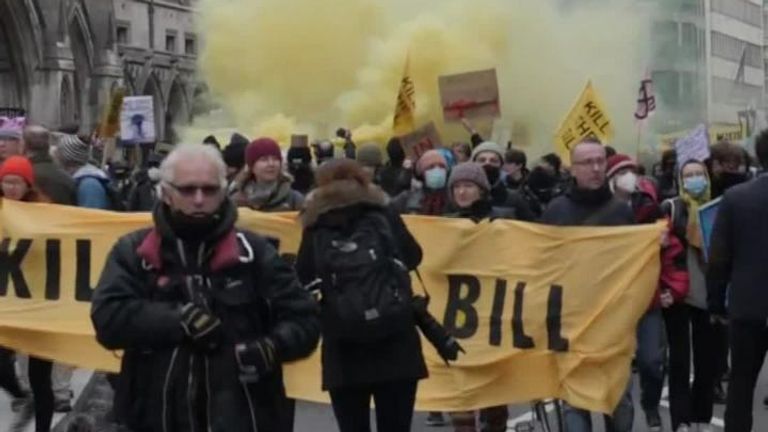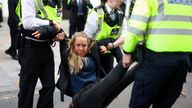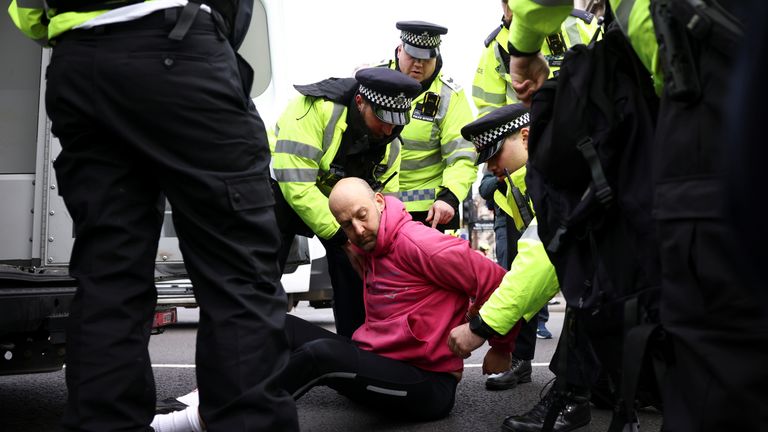House of Lords vote down government's attempt to control protests
Some peers described the proposals as "draconian", a "wider assault on our democracy", and "reminiscent of Cold War eastern bloc police states".
Tuesday 18 January 2022 13:06, UK
The government's attempt to introduce laws to contain protests has been dealt a major blow after the House of Lords voted down a number of the controversial proposals.
The government had been moved to act after the disruption caused by eco-activists such as Insulate Britain.
But the Lords rejected several of the proposed powers, including:
• Allowing police officers to stop and search anyone at a protest "without suspicion" for items used to prevent a person being moved, known as "locking-on"
• Allowing people with a history of causing serious disruption to be banned by the courts from attending certain protests
• A proposal to make it an offence for a person to disrupt the operation of key national infrastructure, including airports and newspaper printers
In a separate defeat, peers backed restricting the imposition of tougher sentences for blocking a highway to major routes and motorways rather than all roads.
Controversial curbs on demonstrations, including powers to impose conditions on protests judged to be too noisy, were also defeated.
Downing Street said is "disappointed" that peers rejected measures aimed at combating the "guerilla tactics" adopted by protesters.
"We will reflect on last night's votes before the bill returns to the Commons," the prime minister's spokesman told reporters on Tuesday.
Why were the laws voted down?
Peers criticised the measures and their introduction at such a late stage of the bill's passage.
Labour frontbencher Lord Rosser said the "sweeping, significant and further controversial powers" had not been considered by the Commons, describing this as an "outrageous way to legislate".
He said: "We cannot support any of these last-minute, rushed and ill-thought-through broad powers… with the exception of approving the increased sentences for wilfully obstructing motorways and major roads."
Green Party peer Baroness Jones of Moulsecoomb said: "These are draconian laws that are a wider assault on our democracy."
Independent crossbencher and prominent QC Lord Carlile of Berriew, who previously served as independent reviewer of terrorism legislation, said: "The dilution of without-suspicion stop and search powers is a menacing and dangerous measure."
Read more on this:
Thousands of activists descended on London with one common goal
Blocking M25 as part of Insulate Britain protests 'legitimate' and 'reasonable'
Subscribe to the Daily podcast on Apple Podcasts, Google Podcasts, Spotify, Spreaker
But Home Office minister Baroness Williams of Trafford said: "The rights to freedom of speech and assembly are a cornerstone of our democracy, and this government will not shrink from defending them.
"But a responsible government, one that stands up for the rule of law, must also defend the rights and freedom of the law-abiding majority.
"Their rights cannot and must not be trampled on by a small minority of protesters, who believe they should not be answerable to the law and should be given carte blanche to cause any amount of disruption at any cost."
'Reminiscent of Cold War eastern bloc police states'
Liberal Democrat Lord Paddick, who was a deputy assistant commissioner in the Metropolitan Police, said: "If the government is determined to bring in these draconian, anti-democratic laws, reminiscent of Cold War eastern bloc police states, they should withdraw them now and introduce them as a separate bill to allow the democratically elected House time to properly consider them."
He added: "The anti-protest measures in the original bill were dreadful. These measures and the way they have been introduced are outrageous."
Responding, Lady Williams said: "The arguments deployed here tonight are about the middle classes trying to stop working people from going to work, and I know where I stand on this."




